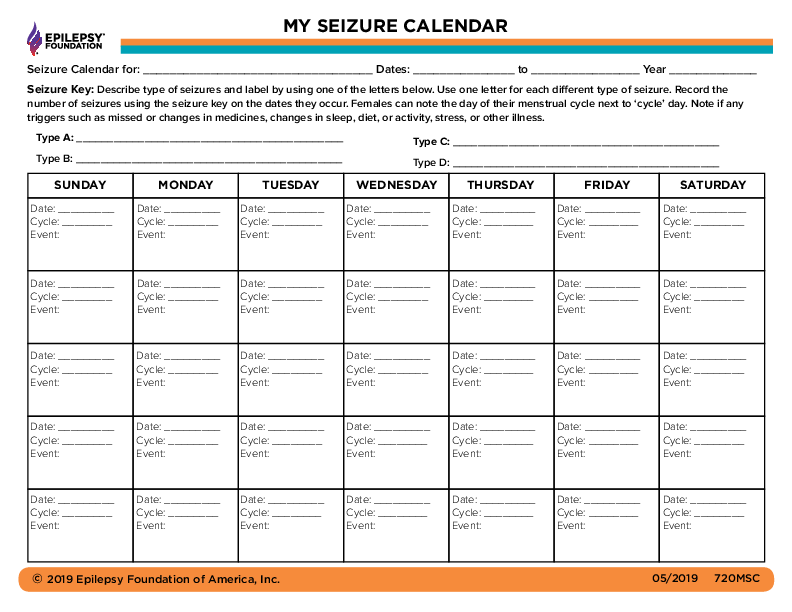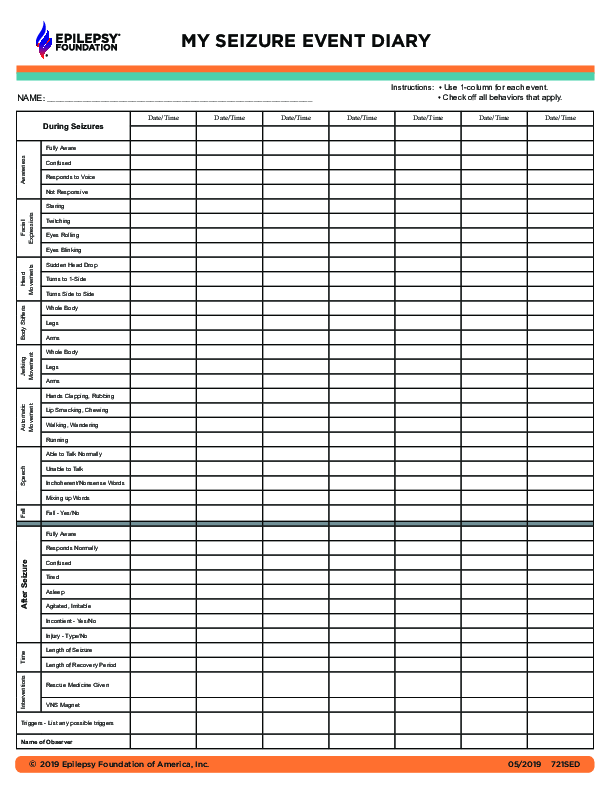How to Indentify Seizure Triggers
The best way to identify possible seizure triggers is to keep a seizure diary. Some people like to use a paper calendar, notebook, or journal. Others use computerized spreadsheets or calendars. To make it even easier, you may want to try the online Seizure Diary on this site or the paper Monthly Seizure Calendar or the paper Seizure Event Diary in our Tool Box. This way you won’t have to rely on your memory to try to figure out what happened when you had a seizure.
Identifying Triggers
Identifying if you have any triggers to your seizures and what they are may take a while. Some people may have very specific factors that occur just before or during the period of time that they have a seizure. Others notice that something may affect their seizures only during certain times of the day or month. Try these steps:
- Identify if there are specific seizure triggers: Get into the habit of writing down in your seizure diary how much you sleep, any stressful events, if you drink alcohol or use illicit or 'recreational' drugs, or are sick with another illness or have a fever. Also write down when you forget to take your medication or run out of medicines, because missed medicines are the most common triggers for many people.
- Identify your high-risk times: Note if there are any specific patterns to when your seizures occur, for example if you've been sick, or if they occur at night, upon awakening, during very stressful times (both 'good' and 'bad' stress), or around the time of your period (if you are a woman with menstrual cycles).
Recording Triggers
If you have a seizure, enter it on the appropriate day of your calendar, noting the type of seizure and the time that it occurred. When possible, think about any unusual things or activities that occurred just prior to the seizure, or in the preceding day, and write those on the calendar too. For the kinds of things to consider, look at the seizure triggers that are described in more detail on other pages in this section.
Evaluating Triggers
After you track and record potential triggers for a period of time, look at your notes.
- Are their any triggers that happen fairly consistently before or around the time of a seizure?
- Do these triggers happen at other times too? If so, how often do the triggers occur and you don't have a seizure?
- Do you have a 'high risk time'? For example, is there a time when your seizures are more likely to occur - a certain time of day, night, time of month?
- How often do you have high risk times without seizures?
- Are there certain situations in which you are more likely to have a seizure? do this for a period of time, it might become more apparent what your seizure triggers could be and when your 'high-risk' times are.
- How often do you have seizures only in certain situations or environments?
Don't forget to look at how often seizures occur with the potential trigger and how often without a trigger.
Take your seizure diaries or calendars to show to your doctor, nurse or other health care professional for his or her opinion. If you are using our online seizure diary, print out a report and take it to your appointment. These reports and calendars can help you and your doctor notice patterns and possible seizure triggers more easily.
The next step is to figure out how to reduce your exposure to those triggers or learn how to change or modify your behavior or lifestyle appropriately.
Resources
Epilepsy Centers
Epilepsy centers provide you with a team of specialists to help you diagnose your epilepsy and explore treatment options.
Epilepsy Medication
Find in-depth information on anti-seizure medications so you know what to ask your doctor.
Epilepsy and Seizures 24/7 Helpline
Call our Epilepsy and Seizures 24/7 Helpline and talk with an epilepsy information specialist or submit a question online.
Tools & Resources
Get information, tips, and more to help you manage your epilepsy.





